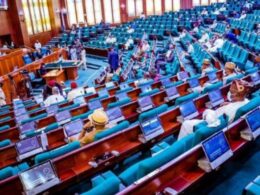Workshop Enhances Internal Control in Adamawa State’s Public Financial Management
Adamawa, Nigeria – The United States Agency for International Development (USAID), in collaboration with the Nigeria State Accountability, Transparency, and Effectiveness initiative, recently organized a three-day workshop focused on the Internal Control Manual and Self-Assessment Tool for Adamawa State.
The event, hosted in Gombe, drew over 40 participants from diverse governmental offices, including the Auditor General of Adamawa State, the Accountant General, the Auditor General for Local Government Areas (LGAs), the Fiscal Responsibility Commission, and representatives from various ministries, departments, and agencies related to education, health, and sanitation.
During her speech, State Team Lead Suzanne Myada emphasized the critical role of internal control in public financial management, noting its importance in reducing the risk of fraud. She stated, “No matter how robust the systems and processes are, a lack of proper internal controls can leave you vulnerable to fraud and misconduct.”
Myada elaborated on State2State’s commitment to aiding Adamawa State in establishing an internal control manual, which will assist different MDAs in identifying risks and developing processes to mitigate them. She remarked, “We have collaborated with the offices of the state Auditor General, the Auditor General for Local Government, and various Public Financial Management institutions. Over recent years, we have helped Adamawa State create its first performance audit manual and review its external audit manual. Our current goal is to develop an internal control manual and self-assessment tools.”
She pointed out that this initiative places Adamawa among the few states in Nigeria equipped with internal control manuals. With these resources, auditors and state officials are expected to improve their effectiveness in audits and enhance accountability, transparency, and efficiency within MDAs.
Myada reminded participants of the importance of applying the knowledge gained during the workshop as they move into the fifth year of the State2State program. “This is a five-year initiative, and we’re now entering our fifth year, having completed four years of meaningful interventions and reforms, particularly in auditing,” she noted, encouraging ownership of the reform process. “Though State2State will eventually conclude, it is imperative that you all maintain the momentum and ensure the sustainability of these processes,” she stated.
Consultant Ismail Adeleye guided participants through the key components of the internal control manual, discussing objectives, control environment, risk assessment, and monitoring. He asserted that part of his role includes assisting participants in conducting a preliminary assessment. “Speed without control often leads to accidents. This workshop aims to develop a robust internal control system that complements existing financial management documentation,” he explained. Adeleye underscored the importance of adhering to established controls to reduce the risk of fraud, which often arises when these controls are ignored or overridden.
Daniel Sakiyo, Assistant Director of Government Accounts at the Adamawa State Auditor General’s office, expressed that the training will foster best practices across agencies. “By creating this manual, MDAs will be more equipped to achieve their operational goals. We have learned about effective internal control mechanisms that can help prevent financial leakages and ensure cost-efficiency, ultimately benefiting Adamawa State,” he stated.
Complementing these remarks, Isa Mustapha, Director of Treasury in the Accountant General’s office, praised the training initiative by highlighting the distinction between laws and operational procedures. “While laws outline an organization’s functions, a manual provides the necessary steps to execute those functions effectively. This training has significantly improved our comprehension of the regulations and their relevance to our objectives,” he added.










Join our Channel...